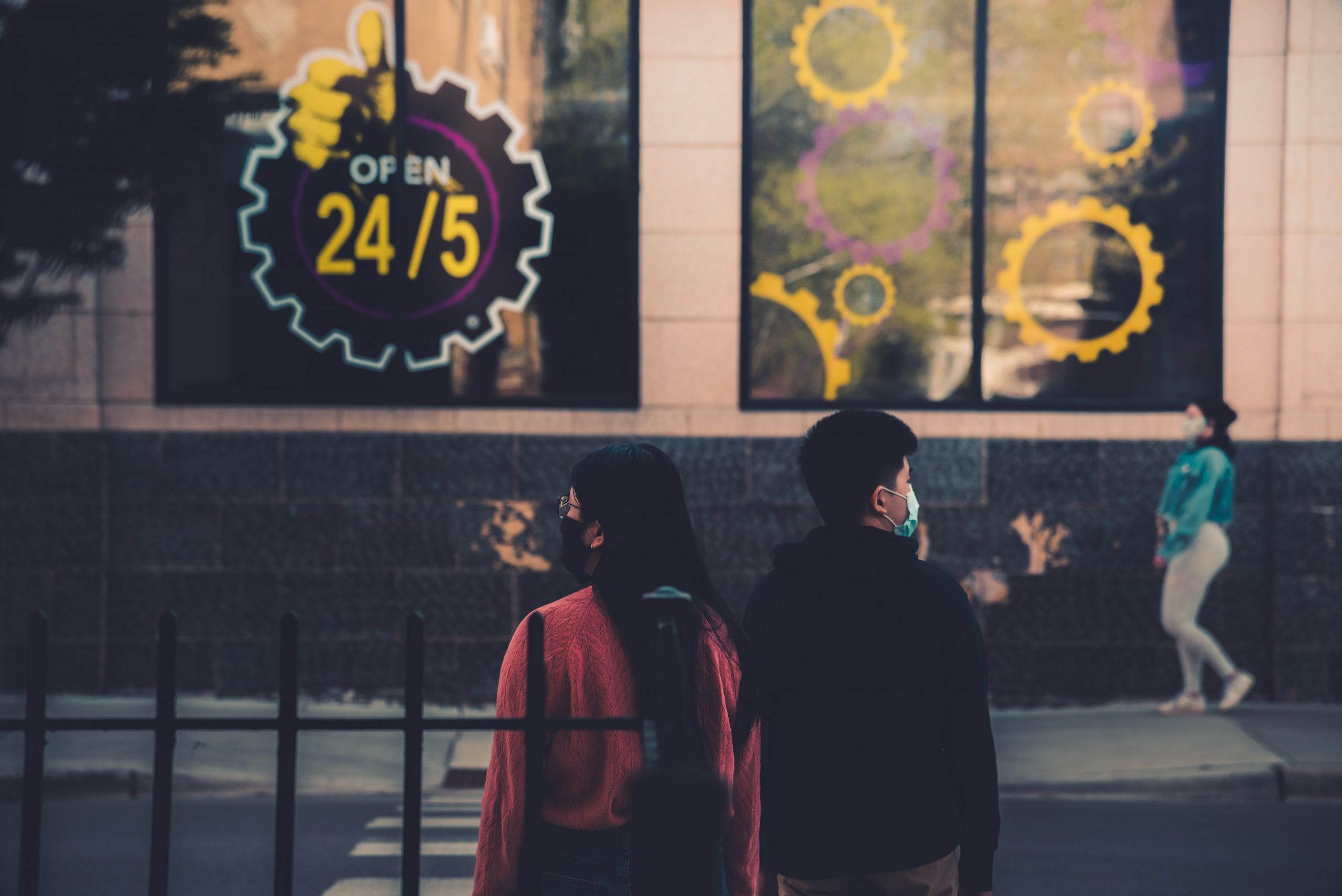Observations in early March
I was riding on the London underground’s Jubilee Line to Green Park station. Right across from me, there was a peculiarly empty bench with no one occupying the lonely space but an old Asian couple. There they sat, both wearing masks with their individual backpacks clenched between their legs. The dingy and harsh lights of the carriage highlighted the streaks of unease apparent across their faces. That is when I noticed the tags hanging from their bags – “We’re from Taiwan, We’re not Chinese”. To me, this marked the start of a new conversation to be had about race and deeply embedded bigotry.
At face value, the loss of 850,000 lives has characterised the severe consequences of the spread of the coronavirus pandemic. However, such a virus has grave implications, particularly in the political sphere, beyond its base level medical complications. With a growing number of people becoming cognisant of the previously underestimated importance of sturdy healthcare systems, public services and the integral role of low-paid workers. People cannot help but rethink the value of life and the nature of the human condition. This trend in the rise of left-wing political ideology has been accelerated by a series of outrageous instances of police brutality as exposed in the United States. Boom! What followed, was the escalation of racial tensions and a series of nationwide protests in the middle of a pandemic. Perhaps this may be remembered as a major epochal shift for the collapse of racism – the beginning of the end!
The death of George Floyd was a pivotal moment in the American racial justice movement, and possibly the only event that could shift global attention away from an ongoing pandemic. Not only did this instance of blatant police brutality incite calls for greater public scrutiny of the American criminal enforcement institutions, it marked the beginning of a much-needed conversation. It is clear that conversation behind the death of George Floyd quickly manifested itself into one regarding racial politics. However, another minority group has shockingly been excluded from this vital conversation – Asian communities. Now, this is not to say that we can equate the types of injustice two groups face, and I bear no intention to diminish the need to talk about the BLM movement. Ultimately, my goal here is to shed light on another less talked-about corner of this racial arena, one that is not only aligned with the colour of our skin, but also our cultural identities.
Has this pandemic become our remedy for racial justice?
Covid-19 originated from the Western world’s greatest geopolitical rival, China. As the virus spread across the Pacific Ocean, the pandemic became political, and soon enough, racial. Only this time, for the worse. And of course, Donald Trump had to pour salt on the wound for Asian Americans by dubbing Covid-19 the ‘Chinese Virus’. The association with the virus with a particular ethnic group has therefore become a tool for individuals with uninformed pre-existing notions towards Asians to justify their bigotry and hateful attitudes.
As such, the pandemic became a political game for politicians to point fingers – this would be fuelled by conspiracies, misinformation, and in Trump’s case, idiocy. At the end of the day, innocent people become the sacrifice for despots hungry for political capital in such a time of turmoil. In 15 weeks, Asian American Pacific Islander Civil Rights Organizations recorded more than 2,100 incidents of attacks and harassment. These numbers continued to rise exponentially during, and in spite of the BLM protests. Alas, these frequent attacks received little to no attention from the mainstream media.
For a media establishment that so frequently harps on about ‘doing better’ and advancing the cause of racial justice, how could they completely overlook an 89-year-old Chinese woman being set on fire in New York City? Or perhaps the Asian woman who was assaulted and pushed into a canal by a group of teens in Ireland? How is it that 32% of Americans have witnessed Asians being assaulted in April, and yet racism did not become a central topic until June? Had these incidents enjoyed the exposure that incidents of police brutality did, would the conversation on race have started soon enough to avoid the tragic deaths of many innocent black people?
What is worse is the realisation that political rhetoric during the pandemic did nothing but legitimise misguided and harmful notions towards the Asian community. For example, Lululemon released a ‘Bat Fried Rice’ t-shirt, despite the fact that videos of Chinese people eating bats were actually filmed in restaurants in Palau (where bats are served as a local dish). The endless barrage of ‘Bat’ memes across social media platforms, was often followed by xenophobic and anti-Asian comments. So why is there a double standard between Asians and Black people as victims of hate speech when it comes to the regulation of racist comments and content on social media platforms. Does it really take the murder of Black people, or a $7 billion ad revenue loss for Facebook to usher in regulations regarding hate speech?
A common misconception is that racism is the most prevalent in the United States. But countries such as the United Kingdom cannot be left off the hook. I have conducted a series of interviews with two groups of Asian students on their experiences with living in London during the pandemic. The first group are those who haven’t been growing up in a Western culture, whilst the latter group consists of people who grew up in Western countries.
Photo: ‘Coronavirus has fuelled racism against Asian-Australians, but why isn’t official data showing it?’ (ABC News)
Interviews:
A, male, Durham University, first year living in the UK:
‘I was just walking on the street of London with my friends, there were six of us, all wearing masks. A group of people from across the street shouted at us ‘Wuhan, Wuhan…get out my country’. We kept silent so they’d leave us alone’
‘In general, people would always avoid us when we go out, nobody would ever walk side by side with us. The way people saw me was as if I am the plague itself’
B, female, UAL, second year living in the UK:
‘As an international student in London, I haven’t personally had any ‘intense’ racist experience. Once in a while however, people do scream ‘Corona’ at me on the street. An Uber driver refused to drive my friend because she was wearing a mask. Almost all my friends have had the experience of being verbally assaulted on the street’
C, male, UCL, first year living in the UK:
‘The fear of contracting coronavirus has taken over my life; I was also frightened by the fact that a Singaporean student here got severely beaten on Oxford Street. So I stayed in my accommodation this summer and almost never went out.
D, male, KCL, grew up in the UK:
‘I’ve not noticed any racism towards me. You can tell where people are from by how they dress. Chinese, Korean and Japanese have distinctive fashion and makeup styles. I am not self-conscious about my race so I wouldn’t notice anyone being discriminatory’
– Have you ever encountered moments when people might have intentionally kept a distance from you on the street?
‘Nope, wouldn’t notice. It’s my home, my people, there’s nothing in the back on my mind that would even make me consider these things
E, female, KCL, grew up in America:
‘As an individual I haven’t experienced any discriminations while in the UK, but that’s perhaps because I dyed my hair green and bleached my eyebrows, so my ‘alien-like’ look confuses people where I’m actually from. However, when I was back in America, there was one time I was inside a shop with my family and someone screamed ‘Kungflu’ at us. I confronted him and he eventually apologised.
F, female, Imperial, has been living in the UK for 7 years:
‘Nobody made discriminatory commotions at me because they can tell I’m not from China by the way I dress. I want people to avoid me, isn’t that a good thing? People here don’t know how to social distance…but no I haven’t seen much of a difference to be honest. My mom feels it; I don’t personally, but I also think it’s because I don’t care.
G, Male, KCL, grew up in Australia:
‘I don’t think that attitudes towards Asians have actually changed as a result of the pandemic. Instead, the pandemic has been used as a justification for individuals with ill-founded notions towards Asians to externalise their bigotry – both verbal and physical. Perhaps an important takeaway is that Asians can become better equipped at identifying those in their lives who try to justify and gaslight them in instances of denigrating racial abuse.’
I was surprised by the drastically different responses I obtained from two groups. These findings have important implications for the broader domain on racism, one that displays that the conversation on race is inextricably linked to the phenomenon of culture hegemony. This led me to ponder, is culture something we must forfeit in exchange for a safe environment and much-desired inclusion? Some readers may challenge my view by insisting that all the assaults are not aligned with race, but cultural factors. However, does the evidence from these interviews prove conclusively that culture hegemony is in fact a key component of racism? If not, should people who did not have the privilege to grow up in a western community naturally be punished? If we live in a society where we must exchange our cultural identities for safe living environments, then perhaps, we really have bowed down to racism.






0 Comments